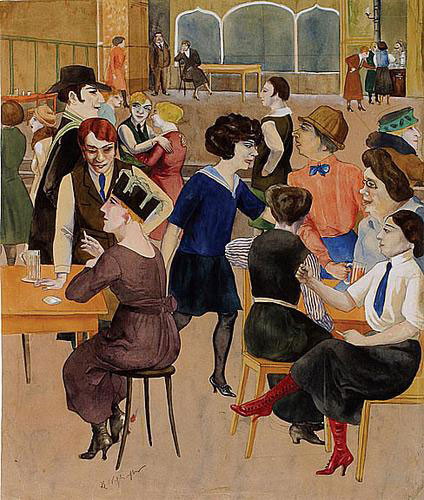As our Paulinka (Megan Briggs) wrote, Sunday was our “designer run.” This is when all the staff, observe a mid-rehearsal in our process so they can get a sense of the staging, tone and mood of the play. Most of it will be subject to change and already, two days later, most of it has. One of the reasons for this anticipated adjustment is that this is the first time we had any au dience. We were removing ourselves from the vacuum. And the view outside the pressure chamber was unexpected, as it always is.
dience. We were removing ourselves from the vacuum. And the view outside the pressure chamber was unexpected, as it always is.
When we started rehearsing A BRIGHT ROOM CALLED DAY I was coming out of three months’ worth of dramaturgical research, mostly reading various political and social histories of the rise and fall of Weimar Republic, and the first two years of the Third Reich. I talked endlessly about the parallels of Weimar’s crumbling and unstable democracy and our own mistaken security that ours could never fall. I brought up the Capitalist Putsch against Roosevelt. We looked at Kushner’s own (self-admittedly immature) comparisons between Regan/Thatcher and Adolf Hitler. We talked about what I thought was going to be our big question: how the hell did this happen, and who was responsible? That’s a good play, right?
Kushner has other ideas. While watching our Agnes (Xanadu Bruggers) and her friends sit around her dining room table, and make witty jokes and tell stories, I flashed back to college and remembered the same scene in a different cozy apartment. I laughed, along with our staff, at a couple’s inability to relax enough to have sex, and beamed with joy when these good, good people think that the tides of Progress are going their way, which reminded me a little of the nights of Clinton’s and Obama’s election. Then Hitler is elected and the Reichstag burns, and we are in less familiar territory, though perhaps not if you take Fox News seriously. God willing, we will never know the darkness of Germany, 1933, let alone the catastrophe to follow.
However, because Kushner’s characters are so recognizable to the progressives among us, we cannot help but be moved and then transplant ourselves into Agnes’ modern flat, with all the ghosts and revelations that are contained there. A Bright Room Called Day is realistic in that its characters speak very intelligently about the political and social world they know, but they are so recognizable, so like our own friends and lovers, that we are instantly conveyed into this funny, sad and mystical world.
Plays are always about people, not ideas. We already knew that of course, but the view of the forest (as opposed to the trees) I got at the designer run is that we were too worried about what was outside the apartment. This was the first part of our work: understanding the terror coming around the corner, and what caused it. Check, we’ve got that down I think. Now, going forward, it is all about making these people are recognizable as possible, and us, as an audience, falling in love with these crazy artists, revolutionaries, communists, and Agnes, who holds them all together.
Oh yeah, and there’s the Devil, too. But that’s for another post.


